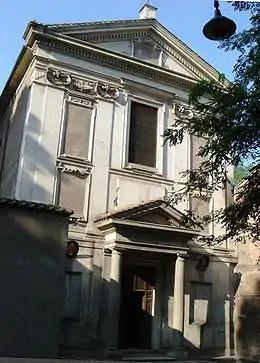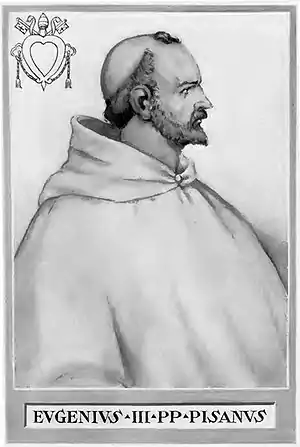1145 papal election
The 1145 papal election followed the death of Pope Lucius II and resulted in the election of Pope Eugene III, the first pope of the Order of Cistercians.

| Papal election 1145 | |
|---|---|
| Dates and location | |
| 15 February 1145 San Cesareo in Palatio, Rome | |
| Key officials | |
| Dean | Corrado Demetri della Suburra |
| Protopriest | Guido Florentinus |
| Protodeacon | Gregorio Tarquini |
| Elected pope | |
| Bernardo da Pisa Name taken: Eugene III | |
 | |
Election of Eugene III
Pope Lucius II, during the whole of his pontificate, had to face the municipal commune at Rome, hostile towards the secular rule of the popes in the Eternal City. The republican faction elected Giordano Pierleoni, brother of the former Antipope Anacletus II, to the post of senator, and demanded that Lucius relinquish all temporal matters into his hands. The pope refused and led a small army against the seat of the commune on Capitol. He was defeated and seriously wounded in this attack, and died on 15 February 1145 in the church of S. Gregorio in clivo scauri.[1] The cardinals present at Rome quickly assembled in the church of San Cesareo in Palatio and on the very same day unanimously elected to the papacy Bernardo da Pisa,[2] pupil of St. Bernard of Clairvaux, who was abbot of the Cistercian monastery of S. Anastasio alle Tre Fontane near Rome and probably did not belong to the College of Cardinals.[3] The elect took the name of Eugene III. Due to hostility of the Roman people, his consecration took place in the monastery of Farfa on 18 February 1145.[4]
Cardinal-electors
There were probably 40 cardinals in the Sacred College of Cardinals in February 1145.[5] Based on examination of the subscriptions of the papal bulls in 1145[6] and the available data about the external missions of the cardinals it is possible to establish that no more than 34 cardinals participated in the election:
| Elector | Cardinalatial Title | Elevated | Elevator | Notes |
|---|---|---|---|---|
| Corrado Demetri della Suburra | Bishop of Sabina | 1113/14 | Paschalis II | Dean of the College of Cardinals; future Pope Anastasius IV (1153–1154) |
| Theodwin, O.S.B. | Bishop of Santa Rufina | ca. 1133 | Innocent II | |
| Pietro | Bishop of Albano | 17 September 1143 | Innocent II | |
| Guarino Foscari, Can.Reg. | Bishop of Palestrina | 22 December 1144 | Lucius II | |
| Rainiero | Priest of S. Prisca | 22 December 1139 | Innocent II | |
| Gregorio della Suburra | Priest of S. Maria in Trastevere | 1 March 1140 | Innocent II | |
| Tommaso | Priest of S. Vitale | 1 March 1140 | Innocent II | |
| Gilberto | Priest of S. Marco | 13 March 1142 | Innocent II | |
| Niccolo | Priest of S. Ciriaco | 13 March 1142 | Innocent II | |
| Manfredo | Priest of S. Sabina | 17 December 1143 | Celestine II | |
| Guido de Summa | Priest of S. Lorenzo in Damaso | 17 December 1143 | Celestine II | |
| Ariberto | Priest of S. Anastasia | 17 December 1143 | Celestine II | |
| Ugo Novariensis | Priest of S. Lorenzo in Lucina | 17 December 1143 | Celestine II | |
| Giulio | Priest of S. Marcello | 19 May 1144 | Lucius II | |
| Ubaldo Caccianemici, Can.Reg. | Priest of S. Croce in Gerusalemme | 19 May 1144 | Lucius II | |
| Robert Pullen | Priest of S. Martino | 22 December 1144 | Lucius II | Chancellor of the Holy Roman Church |
| Guido Puella, Can.Reg. | Priest of S. Pudenziana | 22 December 1144 | Lucius II | |
| Villano Gaetani | Priest of S. Stefano in Monte Celio | 22 December 1144 | Lucius II | Future archbishop of Pisa (1146–1175) |
| Gregorio Tarquini | Deacon of SS. Sergio e Bacco | 9 March 1123 | Callixtus II | Protodeacon |
| Odone Bonecase | Deacon of S. Giorgio in Velabro | 4 March 1132 | Innocent II | |
| Guido Pisano | Deacon of SS. Cosma e Damiano | 4 March 1132 | Innocent II | |
| Ottaviano de Monticelli | Deacon of S. Nicola in Carcere | 25 February 1138 | Innocent II | Future Antipope Victor IV (1159-1164) |
| Guido de Castro Ficeclo | Deacon of the Holy Roman Church | 1139 | Innocent II | |
| Pietro | Deacon of S. Maria in Portico | 19 September 1141 | Innocent II | |
| Gregorio | Deacon of S. Angelo in Pescheria | 17 December 1143 | Celestine II | |
| Astaldo degli Astalli | Deacon of S. Eustachio | 17 December 1143 | Celestine II | |
| Giovanni Caccianemici, Can.Reg. | Deacon of S. Maria Nuova | 17 December 1143 | Celestine II | |
| Giovanni Paparoni | Deacon of S. Adriano | 17 December 1143 | Celestine II | |
| Rodolfo | Deacon of S. Lucia in Septisolio | 17 December 1143 | Celestine II | |
| Berardo | Deacon of the Holy Roman Church | 19 May 1144 | Lucius II | |
| Giacinto Bobone | Deacon of S. Maria in Cosmedin | 22 December 1144 | Lucius II | Future Pope Celestine III (1191–1198) |
| Cinzio | Deacon of the Holy Roman Church | 22 December 1144 | Lucius II | |
| Jordan, O.Carth. | Deacon of the Holy Roman Church | 22 December 1144 | Lucius II | |
| Bernard, Can.Reg. | Deacon of the Holy Roman Church | 22 December 1144 | Lucius II |
Thirteen electors were created by Pope Innocent II, nine by Celestine II, eleven by Lucius II, one by Pope Callixtus II and one by Pope Paschalis II.
Absentees
| Elector | Cardinalatial Title | Elevated | Elevator | Notes |
|---|---|---|---|---|
| Alberic de Beauvais, O.S.B.Cluny | Bishop of Ostia | 3 April 1138 | Innocent II | Papal legate in France[7] |
| Imar, O.S.B.Cluny | Bishop of Tusculum | 13 March 1142 | Innocent II | Papal legate in England[8] |
| Guido Florentinus | Priest of S. Crisogono | 1139 | Innocent II | Protopriest; papal legate in Lombardy[9] |
| Rainaldo di Collemezzo, O.S.B.Cas. | Priest of SS. Marcellino e Pietro | ca. 1139–1141 | Innocent II | Abbot of Montecassino (external cardinal[10]) |
| Ubaldo Allucingoli | Priest of S. Prassede | 16 December 1138 | Innocent II | Papal legate in Lombardy;[11] future Pope Lucius III (1181–1185) |
| Ubaldo | Priest of SS. Giovanni e Paolo | 19 December 1141 | Innocent II | Papal legate in Poland and Denmark[12] |
Notes
- See Bernhardi, pp. 451–452; Robinson, p. 78; and The Catholic Encyclopedia
- Robinson, p. 78
- Bernardo's cardinalate is attested in some of the contemporary chronicles (cited by Bernhardi, p. 452 note 4); however, there are doubts concerning their factual accuracy due to lack of other documentary proofs of this affirmation, particularly the silence of Liber Pontificalis and the official papal documents. Bernhardi, pp. 451–452; Brixius, p. 41 no. 7; and Zenker, pp. 185–186 concluded that he was actually promoted to the cardinalate. Refutation by Horn, pp. 42–45.
- Bernhardi, p. 453; Jaffé, p. 20
- Reconstruction is based on Brixius, p. 22 note 6, and Horn, pp. 304–305, with the following correction: bishop Rodolfo of Orte (listed by Brixius) has been excluded because he was not a cardinal at that time (Zenker, pp. 52–53). Besides, the elect is not listed as cardinal, although Brixius indicates that he was.
- Jaffé, pp. 7 and 20
- Zenker, p. 18; he did not subscribe any papal bulls between 30 May 1144 and 18 November 1145 (Jaffé, pp. 7 and 20)
- Zenker, pp. 44–45; he did not subscribe any papal bulls between 19 December 1144 and 18 November 1145 (Jaffé, pp. 7 and 20)
- Kehr, vol. VI/1, p. XXVIII and vol. VI/2, p. XXI; he did not subscribe any papal bulls between May 1144 and April 1145 (Jaffé, pp. 7 and 20)
- Zenker, pp. 191–192
- Kehr, vol. VI/1, p. XXVIII and vol. VI/2, p. XXI; Karol Maleczyński, Studia nad dokumentem polskim, Wrocław 1971, p. 61 note 49. He did not subscribe any papal bulls between 30 April 1144 and 21 December 1145 (Jaffé, pp. 7 and 20)
- Karol Maleczyński, Studia nad dokumentem polskim, Wrocław 1971, pp. 55–76; He did not subscribe any papal bulls between 19 February 1144 and 9 October 1145 (Jaffé, pp. 1, 7 and 20)
Sources
- Horn, Michael (1992). Studien zur Geschichte Papst Eugens III. (1145-1153) (in German). Frankfurt am Main: Peter Lang Verlag.
- Jaffé, Phillipp (1888). Regesta pontificum Romanorum ab condita Ecclesia ad annum post Christum natum MCXCVIII, vol. II (in Latin). Leipzig.
- Kehr, Paul Fridolin (1906–1975). Regesta pontificum Romanorum. Italia Pontificia. Vol. I–X (in Latin). SUL Books in the Public Domain. Archived from the original on 2006-02-23.
- Miranda, Salvador. "Election of February 15, 1145 (Eugenius III)". The Cardinals of the Holy Roman Church. Florida International University.
- Robinson, Ian Stuart (1990). The Papacy 1073–1198. Continuity and Innovation. Cambridge Medieval Textbooks. Cambridge University Press. ISBN 0-521-31922-6.
- Zenker, Barbara (1964). Die Mitglieder des Kardinalkollegiums von 1130 bis 1159 (in German). Würzburg.
- Brixius, Johannes Matthias (1912). Die Mitglieder des Kardinalkollegiums von 1130-1181 (in German). Berlin: R. Trenkel.
- Bernhardi, Wilhelm (1883). Konrad III (in German). Leipzig: Verlag von Dunder & Humblot.